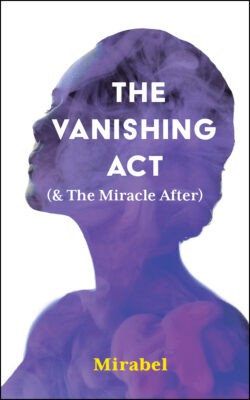The Vanishing Act (& The Miracle After) by Mirabel, also known as Avleen K. Mokha, is an intimate and raw collection that explores trauma, abuse, grief, and healing. Divided into two parts, the first half delves deep into the idea of being stuck in grief, of being trapped in a relationship which causes misery. The second half, as if by miracle, finds its way out of grief and towards a state of hope and healing. All the while, the collection self-consciously thinks about writing as a tool for recovery, as an escape, as a way to write oneself into a better possible world.
The collection opens with the poem “Ideation,” which plays with ideas of intimacy and privacy, drawing the reader in, but forcing us to question what it means to peer into the intimate domestic moments described. Mirabel writes:
A new opening, a spare
set of keys. Greet the neighbours
but don’t let them peek.
The speaker opens up her home to us, a symbolic invitation to the reader to come into the work and explore the poems’ contents, but shows a decisive caution against a kind of voyeuristic peeking into one’s private space. Throughout the collection, the speaker delicately navigates this line between a desire for privacy, and a desire to share her most intimate traumas and feelings.
The Vanishing Act (& The Miracle After) Guernica Editions
Mirabel
$20.00
paper
96pp
9781771837958
The collection sensitively emphasizes the fear and violence experienced by the speaker. In “Handle With Care,” Mirabel writes:
It is the breakability of things
which allows them to be beautiful …
(…) My mouth
has become glass under your gaze
(…)
You can break me with your breath. I am
so delicate in this world that keeps on breaking.
It is the kind of beauty I wish did not exist.
The speaker finds a tragic beauty in the constant fear of being broken by her partner. Mirabel expertly and subtly renders the domestic space, a space which is meant to be a safe haven from the world, similarly dangerous, as everyday household items “like a knife kept out to dry / on a washcloth by the sink” become eerie and vaguely threatening. Mirabel’s speaker boldly states that “Nothing is criminal unless it harms a man,” as the work shifts seamlessly between the horrors of domestic violence and systematic patriarchal violence.
The collection continues to play with the tension between what is private and what is public as it relates to writing and publication, as several poems think about what it means to publish that which is most private. For example, “Cautionary Tale” writes hesitantly, “Let’s not publish / our feelings yet”. While inevitably expository, writing becomes the vehicle for healing.
I’ve been calling for help
my whole life. I’ve been writing,
it’s been helping, and
you’ve been reading me.
What a flirt, each of us —
pulp and word.
In the second half, the speaker writes, “I keep writing love stories / which feature you and me, / but today I want / to put the pen down.” She works to find a way to write herself out of love, out of grief, out of misery.
Mirabel draws the reader in by opening up her world to us as we follow her speaker’s journey towards healing, towards hope, towards self-reclamation. It is a sensitive intersectional feminist work of value, not to be missed.mRb






0 Comments